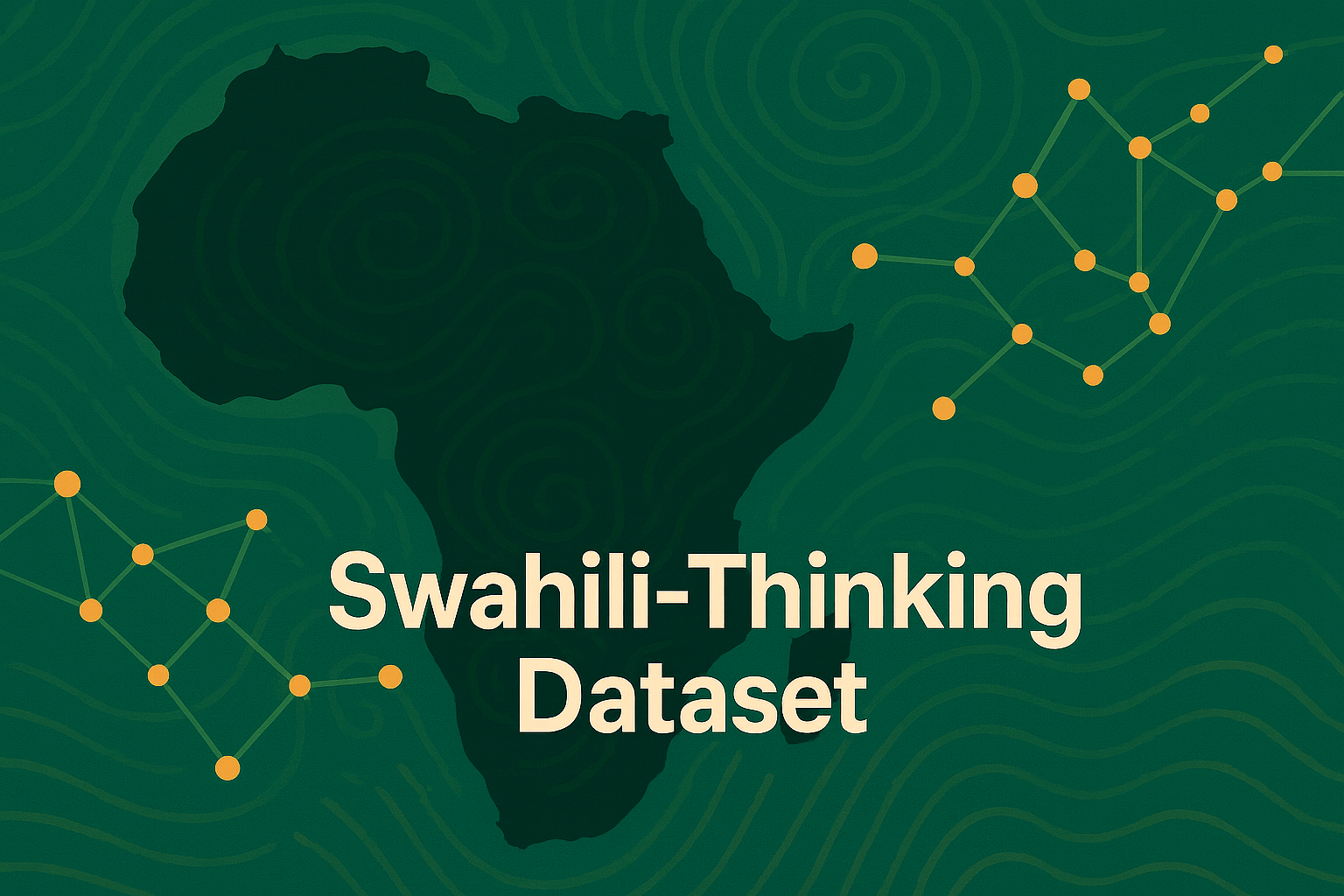A quiet but monumental shift is underway in the world of African technology. For too long, the most powerful Artificial Intelligence models, the kind used by major tech companies and governments have struggled to do one essential thing in Swahili: think for themselves.
While AI can quickly translate a sentence into Swahili, it often fails when tackling complex problems, like figuring out why a financial transaction failed or guiding a patient through multi-step self-care. It could give the answer, but it couldn't "show its work."
That era of linguistic limitation is over.
The breakthrough is the work of Alfaxad Eyembe, an innovator currently studying Mechanical & Electrical Systems Design at Kyoto University of Advanced Science. Eyembe recently received a prestigious O’Shaughnessy Ventures (OSV) Grant – – part of the firm's $220,000 initiative to fund groundbreaking creators, and has released the Swahili Thinking Dataset.
Eyembe is also part of Nadhari AI lab, an open-source AI research and product lab aiming to advance frontier AI research and applications in Sub-saharan Africa.
''Africa is lagging behind in the AI race. We lack the infrastructure and capital needed to reach the frontier. The good news is that knowledge is not scarce, and we have the technical talent to push us through.''

His resource is the first publicly available, high-quality "chain-of-thought" (CoT) reasoning dataset for an African language, a breakthrough that promises to unlock a massive wave of innovation and economic opportunity for the over 200 million Swahili speakers across East and Central Africa.
The Digital Dilemma: Why AI Couldn't "Think" in Swahili
To understand the scale of this breakthrough, one must first grasp the core problem in African AI development, what experts call the "reasoning deficit."
Large language models (LLMs) used by tech giants primarily learn complex logic and problem-solving through massive datasets of English, French, or Spanish text. When these models are asked a complex question in Swahili, they typically perform a two-step process: they translate the Swahili query into English, solve the complex problem in English, and then translate the final answer back into Swahili.

This method is fast but deeply flawed. It often misses cultural context, misinterprets nuanced instructions, and, most critically, prevents the model from developing native Swahili logic. The model never truly understands why it arrived at the answer; it just translates a pre-solved thought process. This failure has limited AI's usefulness in high-stakes areas:
- Financial Literacy: The AI struggles to explain compound interest or complex loan structures in locally relatable, step-by-step Swahili.
- Customer Service: Automated chatbots often revert to confusing or unhelpful scripts because they lack the ability to decompose a multi-part complaint.
- Education: Tutors and learning tools cannot guide students through the logical steps of a math or science problem, leading to reliance on rote memorization.
Eyembe’s dataset solves the problem by providing the essential training data: high-quality Swahili conversational AI responses paired with their full, logical chain-of-thought, all in native Swahili. By feeding the AI thousands of examples of how to reason step-by-step in the language, the model gains true native reasoning capabilities.
5 High-Impact Opportunities Fueling the Swahili AI Boom
The release of the Swahili Thinking Dataset is not just a win for academia; it is a catalyst for five major economic and social opportunities across East Africa:
1. Founding & Scaling Swahili-Native LLM Startups
The existence of a high-quality reasoning dataset immediately lowers the barrier for African entrepreneurs and established firms to build commercial-grade Swahili Large Language Models (LLMs). Previously, a startup would need millions of dollars and years to create a functional CoT dataset. Now, they have an open-source head start.
- Model Training and Fine-Tuning: Startups can specialize in building compact, efficient LLMs (similar to the work done by companies like Lelapa AI) optimized for low-resource environments and local use cases.
- Commercializing API Access: Companies can create proprietary Swahili NLP (Natural Language Processing) tools and offer them via an API (Application Program Interface) for other businesses to plug into, including sophisticated services like context-aware chatbots and native sentiment analysis.
- Targeted Seed Funding: This specialized, open-source work is highly attractive to investors who prioritize digital inclusion and African digital sovereignty, validating the early investment made by the OSV Grant.
2. Revolutionizing HealthTech and Diagnostics
The improved reasoning capability is crucial for implementing complex AI solutions in high-stakes sectors across East Africa.
- Advanced Diagnostics: AI can move beyond basic symptom-checkers to sophisticated diagnostic assistants. An AI could be trained to interpret a patient's symptoms, factor in regional disease prevalence (e.g., malaria, maternal health issues), and generate a multi-step triage plan, all explained clearly to a community health worker in Swahili. This closes the gap where human expertise is scarce.
- Informed Healthcare Decisions: By providing step-by-step guidance, the AI empowers millions of patients, particularly young people and families, to make more informed decisions about their own health and when to seek professional care.
3. Data Jobs and the New "Lingua-Economy"
The CoT dataset needs continuous expansion and refinement, creating new job categories for African linguists.
- High-Value Annotation Roles: The project drives demand for Swahili native speakers to serve as data annotation specialists. These are higher-skilled, higher-paying freelance or remote roles focused on validating, correcting, and lengthening the AI's reasoning chains. This work requires deep linguistic and cultural context, effectively elevating the economic value of being a native speaker.
- Localization Specialists: As AI tools improve, global companies entering the market will need experts to localize their products and services (e.g., e-commerce, banking, government portals) using the newly smart models.
4. Fueling Precision AgriTech and Climate Resilience
Agriculture, the backbone of many East African economies, will benefit immensely from more logical AI tools, building on existing initiatives like Microsoft's Project Gecko/Digital Green.
- Context-Aware Advice: Farmers can use simple voice inputs to ask complex queries like, "My maize leaves are yellowing, and we haven't seen rain in two weeks. What should I do?" The CoT AI can then generate a multi-step solution that factors in local soil composition, current weather data, and market pricing, giving farmers precise, actionable advice in Swahili, helping to optimize yields and fight climate volatility.
- Educational Content: The models can be used to create highly localized, interactive training videos and resources that explain complex agricultural techniques through reasoned, step-by-step narration.
5. A Pan-African Blueprint for Digital Equality
The Swahili Thinking Dataset establishes a crucial proof of concept, demonstrating the feasibility of building complex digital infrastructure for African languages.
- Setting the Standard: This open-source success demonstrates to governments and researchers that it is both possible and necessary to build high-quality reasoning resources for African languages.
- Accelerating Other Languages: The methodology pioneered by Eyembe for Swahili can now be replicated and adapted much faster for the continent's other high-resource languages (like Yoruba, Hausa, or Amharic), accelerating the development of a truly multilingual and inclusive African AI ecosystem. This movement challenges digital colonialism and builds an African-centric AI future.
The open-source nature of the project is a clear call to action: developers, linguists, and researchers are invited to contribute to the dataset, ensuring that this foundation rapidly expands.
This is the moment where African innovation takes control of its own digital destiny.
Release announcement can be found here
The Dataset can be seen here